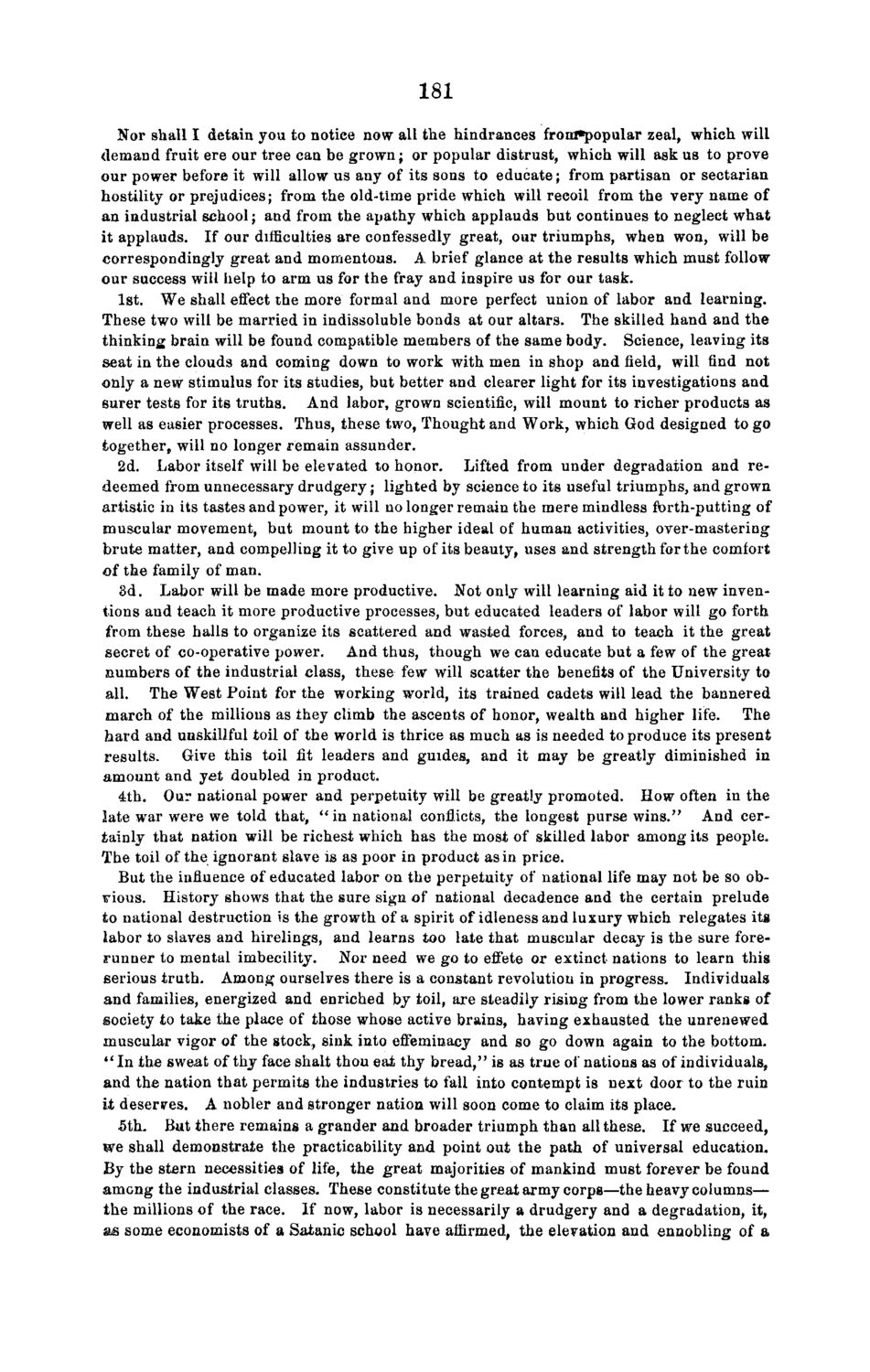| |
| |
Caption: Board of Trustees Minutes - 1868
This is a reduced-resolution page image for fast online browsing.

EXTRACTED TEXT FROM PAGE:
181 Nor shall I detain you to notiee now ail the hindrances front»popular zeal, which will demand fruit ere our tree can be grown; or popular distrust, which will ask us to prove our power before it will allow us any of its sons to educate; from partisan or sectarian hostility or prejudices; from the old-time pride which will recoil from the very name of an industrial school; and from the apathy which applauds but continues to neglect what it applauds. If our difficulties are confessedly great, our triumphs, when won, will be correspondingly great and momentous. A brief glance at the results which must follow our success will help to arm us for the fray and inspire us for our task. 1st. We shall effect the more formal and more perfect union of labor and learning. These two will be married in indissoluble bonds at our altars. The skilled hand and the thinking brain will be found compatible members of the same body. Science, leaving its seat in the clouds and coming down to work with men in shop and field, will find not only a new stimulus for its studies, but better and clearer light for its investigations and surer tests for its truths. And labor, grown scientific, will mount to richer products as well as easier processes. Thus, these two, Thought and Work, which God designed to go together, will no longer remain assunder. 2d. Labor itself will be elevated to honor. Lifted from under degradation and redeemed from unnecessary drudgery; lighted by science to its useful triumphs, and grown artistic in its tastes and power, it will no longer remain the mere mindless forth-putting of muscular movement, but mount to the higher ideal of human activities, over-mastering brute matter, and compelling it to give up of its beauty, uses and strength for the comfort of the family of man. 3d. Labor will be made more productive. Not only will learning aid it to new inventions and teach it more productive processes, but educated leaders of labor will go forth from these halls to organize its scattered and wasted forces, and to teach it the great secret of co-operative power. And thus, though we can educate but a few of the great numbers of the industrial class, these few will scatter the benefits of the University to all. The West Point for the working world, its trained cadets will lead the bannered march of the millions as they climb the ascents of honor, wealth and higher life. The hard and unskillful toil of the world is thrice as much as is needed to produce its present results. Give this toil fit leaders and guides, and it may be greatly diminished in amount and yet doubled in product. 4th. Our national power and perpetuity will be greatly promoted. How often in the late war were we told that, " in national conflicts, the longest purse wins." And certainly that nation will be richest which has the most of skilled labor among its people. The toil of the ignorant slave is as poor in product as in price. But the influence of educated labor on the perpetuity of national life may not be so obvious. History shows that the sure sign of national decadence and the certain prelude to national destruction is the growth of a spirit of idleness and luxury which relegates its labor to slaves and hirelings, and learns too late that muscular decay is the sure forerunner to mental imbecility. Nor need we go to effete or extinct nations to learn this serious truth. Among ourselves there is a constant revolution in progress. Individuals and families, energized and enriched by toil, are steadily rising from the lower ranks of society to take the place of those whose active brains, having exhausted the unrenewed muscular vigor of the stock, sink into effeminacy and so go down again to the bottom. *' In the sweat of thy face shalt thou eat thy bread," is as true of nations as of individuals, and the nation that permits the industries to fall into contempt is next door to the ruin it deserves. A nobler and stronger nation will soon come to claim its place. 5th. But there remains a grander and broader triumph than all these. If we succeed, we shall demonstrate the practicability and point out the path of universal education. By the stern necessities of life, the great majorities of mankind must forever be found among the industrial classes. These constitute the great army corps—the heavy columns— the millions of the race. If now, labor is necessarily a drudgery and a degradation, it, as some economists of a Satanic school have affirmed, the elevation and ennobling of a
| |